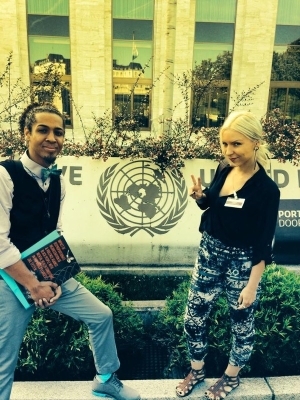Alumna Uncovers Truth Behind Bars
February 24, 2015 / by Shirley S. Shin- Alumni
As a longtime recovering drug addict who experienced homelessness, Kristina Ronnquist, MSW ’14, went through years of interacting with law enforcement. Her encounters, however, were different from those experienced by many people of color.
“During that time, I was pulled over by police multiple times, most of which did not end up in arrest. They would look at my license, see that I’m a white female from an affluent neighborhood and tell me to go home,” she recalled. “I never thought anything of it at that time. I was really ignorant. I thought I was just lucky that I didn’t go to prison.”
It wasn’t until she took a sociology class in college when she learned about the disproportionate sentences for crack and cocaine users that she realized luck probably had little to do with it.
“I thought, wait a minute. I don’t think it was just a coincidence that I got off all of those times,” she said. “How different would it have been for me had I been a woman of color? Would I have gotten off so easy?”
Making headway
Now Ronnquist is on a mission to change the system for the incarcerated and recently spoke about human rights violations in Los Angeles County prisons at the 85th International Convention on the Elimination of All Forms of Racial Discrimination in Geneva, Switzerland.
Representing the nonprofit Dignity and Power Now, Ronnquist and a colleague shared a report that showed disproportionate incarceration of and violence against black people with mental heath conditions in Los Angeles County jails. The report provided on-the-ground information regarding the actual state of racial justice in the prisons.
“We lobbied the [Committee on the Elimination of Racial Discrimination] in an effort for them to ask the U.S. government particular questions,” she said. “What efforts have been undertaken to address racial disparities in access to mental health services prior to contact with the criminal justice system? What measures have been taken to correct the overreliance on incarceration of racial minorities with mental health conditions?”
To help ensure federal oversight, Ronnquist also asked the committee to require by law that relevant institutions collect data and generate analysis according to race, ethnicity, gender, sexual orientation and mental health diagnosis of incarcerated people with mental illness.
“There is a lot of focus on race and disproportionate incarceration but not on mental illness and how people of color are disproportionately affected,” she said. “Racial minorities with mental health conditions are routinely pushed into prisons rather than alternative community programs that better suit their needs.”
Finding her life’s purpose
Using her personal experience as a jumping-off point, Ronnquist has dedicated her career to prison reform advocacy. After receiving her bachelor’s degree in communications from San Francisco State University, she began volunteering with A New Way of Life Reentry Project, where she helped families of lifers write speeches and speak publically at parole hearings in Sacramento.
In 2011, Ronnquist began teaching social justice courses at San Quentin State Prison as an educator with Alliance for Change.
“Anyone that does work around prison reform or mass incarceration has to actually interact with those that are behind bars. It is powerful beyond measure,” she said. “I went there thinking that I’m going to help them and I’m going to teach them new things. I didn’t think I would encounter some of the smartest, kindest, most humane human beings I’ve ever met.”
Through her interactions with the inmates, many of them serving life sentences, Ronnquist said she felt empowered to advocate even harder for the incarcerated. She decided the Master of Social Work program at USC was the best way to better prepare herself for this line of work.
In the thick of it
Her spirit of activism didn’t stop while in school. During her second-year internship at the Century Regional Detention Facility, the women’s county jail in Lynwood, California, Ronnquist said she observed widespread inmate abuse, ranging from physical and verbal assault to overmedication to medical and mental health neglect. She promptly took action.
“I had to be careful how to go about blowing the whistle,” she said. “It was terrifying, but someone had to say something.”
Ronnquist contacted the American Civil Liberties Union, which helped connect her to the Department of Justice. She wrote a 24-page document outlining all of the observed abuse, testified about her experience before the Los Angeles Board of Supervisors and held a press conference for media. She eventually met with the Office of the Inspector General to offer suggestions and help shape a jail-monitoring plan.
Fresh out of graduate school, Ronnquist has guest lectured at multiple colleges to share her ideas for policy reform. She’s also working closely with reporters in an attempt to expose the truth of what’s going on behind the walls of Los Angeles County’s jails.
Currently serving as a therapist at a drug and alcohol center in West Hollywood, Ronnquist has now set her sights on a PhD program to further her research on race-based disparities in the treatment of mentally ill inmates. Her goal, she says, is clear: She wants to address the flaws in the system, find alternatives and bring dignity back to prisoners.
“The bottom line is, I believe everybody should get a second chance,” she said.
To reference the work of our faculty online, we ask that you directly quote their work where possible and attribute it to "FACULTY NAME, a professor in the USC Suzanne Dworak-Peck School of Social Work” (LINK: https://dworakpeck.usc.edu)
